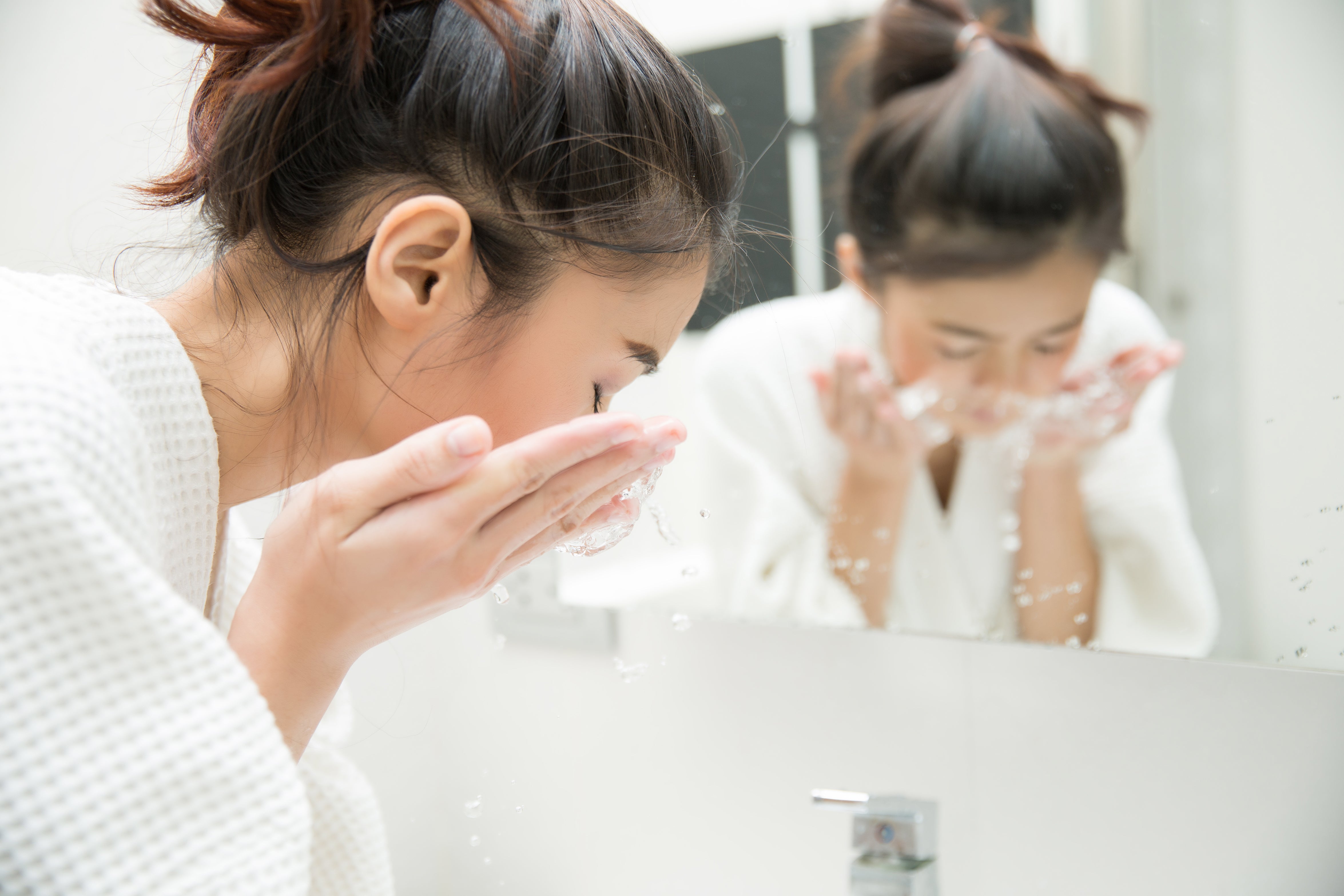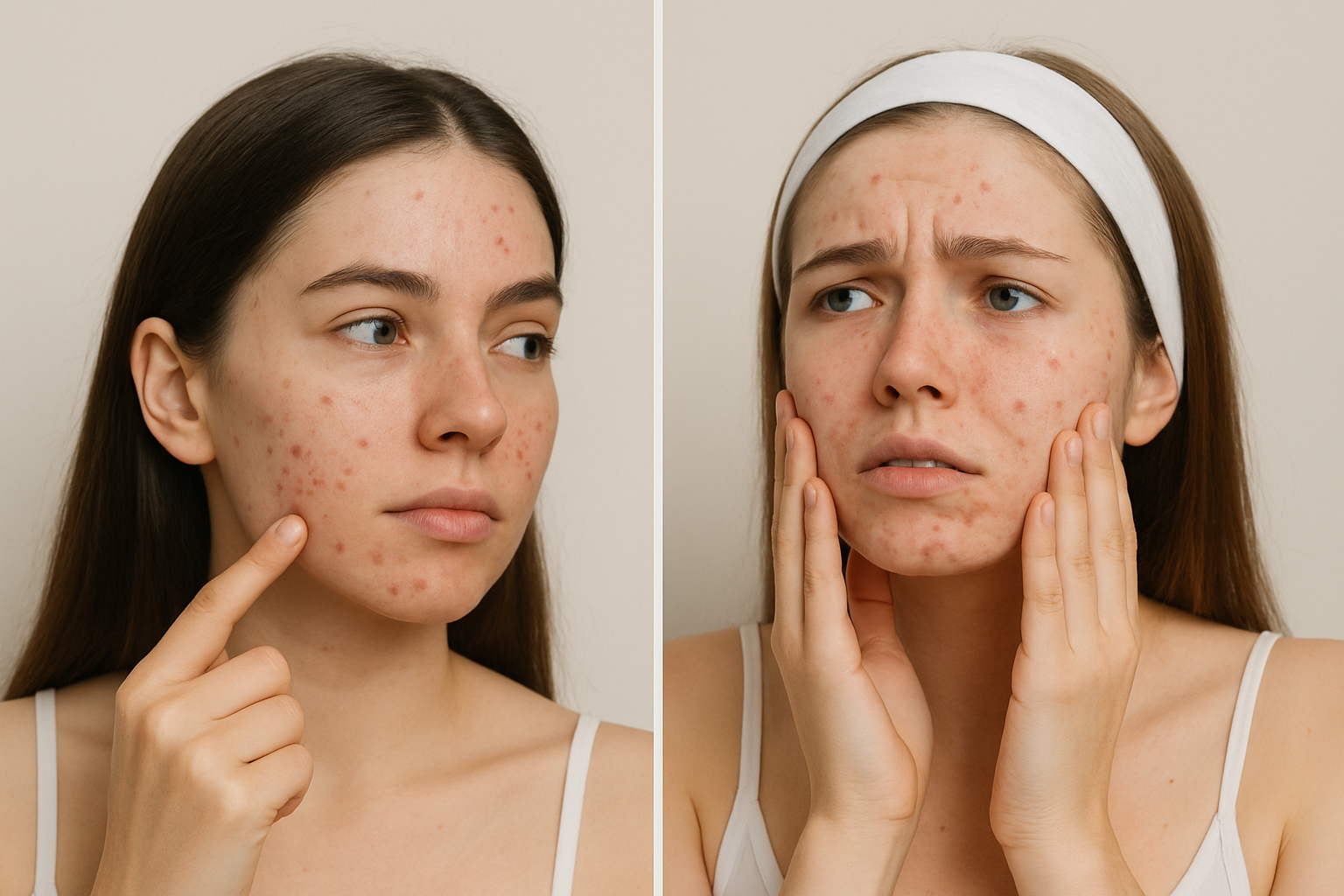
Top 10 skincare mistakes that are making your acne worse
Dealing with acne is a real pain in the butt and often times we will do anything to get rid of a breakout as quickly as possible. Here are some things you might be doing or using that could actually be making your acne worse!
1. Over cleansing and exfoliating
People with acne-prone skin tend to also be oilier and instinctively think that cleansing several times a day will solve the problem. Stick to cleansing twice a day, morning and night. In fact, you may only really need to use a cleanser at night and simply rinse your face with lukewarm water in the morning. Over cleansing will irritate your skin, cause excessive dryness and cause your skin to produce oil in overdrive, making you even oilier overtime. This may also damage your skin barrier, causing your skin to be sensitized and more prone to breaking out. The same thing goes with over-exfoliation.
Tip: We recommend not using physical/abrasive scrubs especially if you have active acne on your face, as this will simply aggravate your acne and potentially make it worse. Stick to chemical exfoliants with gentle AHA's such as lactic acid and mandelic acid. You can also look for chemical exfoliators with salicylic acid which keeps your pores clean. Typically these are safe to use daily, however we recommend using them 2-3 times a week and only increasing to daily use if your skin can tolerate it.
2. Using too many acne-fighting products in your routine
Often times we think it is necessary to buy an entire acne-fighting skincare "kit" or buy the whole acne line of products from a brand. This simply isn't necessary. For example, using an acne-fighting face wash, toner, moisturizer and spot treatment with benzoyl peroxide in it will simply irritate your skin, leaving it red and super sensitized!
Tip: Limit your active ingredient (e.g. benzoyl peroxide) to one product first, such as a cleanser or spot treatment. Use gentle, hydrating skincare products to offset any irritation from the acne-treating product.
3. Combining too many actives in your skincare routine
Combining several actives to fight acne can be extremely irritating to your skin. Using a retinoid, benzoyl peroxide, salicylic acid, sulfur and a clay mask in one routine is not going to help your skin! Some actives such as benzoyl peroxide do not work well with other actives (like retinol) and may render the other actives useless when paired together. To avoid this, you can use a benzoyl peroxide face wash in the morning and use a retinoid at night.
Tip: Use one active during the day and one active during the night. Slowly introduce one active at a time and reduce/stop usage if your skin becomes too sensitized.
4. Applying too many skincare products
Especially for people with acne-prone skin, less is more. Simplifying your skincare routine is great because it minimizes risk of irritation.
Tip: Start with the basics and slowly add one new product at a time if you see fit. This way it is easier to isolate which product may be breaking you out. The basics are: a cleanser, moisturizer and sunscreen. If you're acne-prone, a spot treatment can also be an essential part of your skincare routine.
5. Not giving products enough time
Don't believe in miracle products that claim to banish acne overnight because those simply do not exist! Many times we try an acne-fighting product, use it for about a week and claim (in frustration) that it didn't work at all and stop using it altogether. Unfortunately, dealing with acne and your skin requires a lot of patience and time for skincare products to work. You'd be surprised at how long you actually have to use the products before you start noticing results.
Tip: Give your products a good amount of time to truly see results. This depends on the active you are using. For example, it may take up to 12 weeks to see the full effects of benzoyl peroxide.
Important note: Sometimes certain ingredients are simply not compatible for your skin and if your acne is consistently getting worse for over a month while using the active, stop using it and consult with a dermatologist. This way you can avoid unnecessary and excessive scarring left by these breakouts.
6. Using "natural" and DIY remedies for acne
I'd like to preface this by saying that not all DIY skincare remedies are bad for you, although a lot of them aren't very effective and some of them are downright terrible for your skin. Natural is definitely not "safer" or "better" for your skin and oftentimes can be very harsh and sensitizing.
Tip: Don't start making your own natural skincare concoction in an effort to clear your acne. Some natural ingredients may be soothing or moisturizing but not necessarily help with acne at all. Some natural things to avoid using directly on your skin include: lemon juice, essential oils (such as undiluted tea tree leaf oil), baking soda, toothpaste and cinnamon. Stick to ingredients that are scientifically proven and tested to work effectively on acne.
7. Picking and popping acne
Squeezing and popping zits is oh so satisfying, but very problematic. You can often end up spreading more bacteria into your skin, causing even more breakouts. You also run the risk of causing permanent scarring and hyperpigmentation by squeezing it yourself.
Tip: Don't pick, pop or squeeze your acne. Leave it to the professionals to extract it.
8. Not using moisturizer
Just because you have oily skin does not mean you don't need to moisturize. On the contrary, it is very important to moisturize in order to rebalance and regulate your skin's sebum production.
Tip: If you have oily skin, make sure you use a moisturizer. You may want to opt for a lightweight, gel or gel-cream formula which doesn't feel too heavy or greasy on the skin. Water based formulations are great for people with acne-prone, oily skin.
9. Not wearing sunscreen
UV exposure from the sun's rays damages your skin's natural barrier and causes acne to dry up, which in turn leads to an increase in oil production. This extra oil can result in more breakouts down the line. UV exposure also triggers more breakouts in the already vulnerable skin of those with conditions like rosacea, worsening existing redness. Scarring and hyperpigmentation left from acne can often get worse/darker with UV exposure. Sunscreen protects your skin and prevents this from happening!
Tip: Wear sunscreen! Find a formula that you love and have no problem applying every day. My personal favorite is the UV Shield by Elta MD, which is lightweight, doesn't leave a white cast and doesn't break me out.
10. Not seeing a dermatologist
Many people wait until their acne gets severe to seek professional help. It is best practice to see a dermatologist as soon as possible, so that they can work with you to come up with a game plan on how to effectively tackle your acne. What most people don't realize is that acne is not just simply a skin condition, but it's chronic skin disease and needs to be treated like one! Treating acne early on will minimize scarring that are left from breakouts.



4 comments
“Thank you for this enlightening blog! It’s a valuable guide to avoiding skincare pitfalls and achieving clearer, healthier skin.”
Okkabeautydubai
This article provides a wealth of knowledge about skincare pitfalls. The depth of information here is truly remarkable and beneficial for those struggling with acne.
VINEVIDA
Really very nice Blog, its amazing :. Keep Sharing, thank you for sharing We are a team of doctors who specialize in skin care and hair care at our clinic. For more info visit our official website https://www.rmvkosmoderma.com or contact us @ +91 829 677 0733
RMV KOSMODERMA
Hello ANDREW LAU, I was searching for some information about acne cream & how to find it easily then I find your website on google, then I visited your website & found very helpful content. Thanks for sharing that information. But I’ve got a question about this section, “2. USING TOO MANY ACNE-FIGHTING PRODUCTS IN YOUR ROUTINE” will be very helpful for me. If you explain in more detail. more detail
Claudia henry
Leave a comment
This site is protected by hCaptcha and the hCaptcha Privacy Policy and Terms of Service apply.